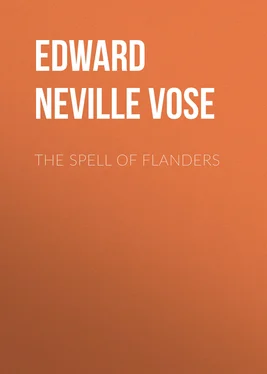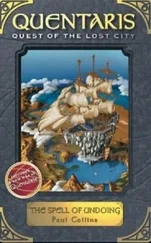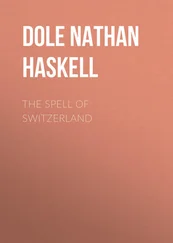Edward Vose - The Spell of Flanders
Здесь есть возможность читать онлайн «Edward Vose - The Spell of Flanders» — ознакомительный отрывок электронной книги совершенно бесплатно, а после прочтения отрывка купить полную версию. В некоторых случаях можно слушать аудио, скачать через торрент в формате fb2 и присутствует краткое содержание. Жанр: Путешествия и география, foreign_antique, foreign_prose, на английском языке. Описание произведения, (предисловие) а так же отзывы посетителей доступны на портале библиотеки ЛибКат.
- Название:The Spell of Flanders
- Автор:
- Жанр:
- Год:неизвестен
- ISBN:нет данных
- Рейтинг книги:5 / 5. Голосов: 1
-
Избранное:Добавить в избранное
- Отзывы:
-
Ваша оценка:
- 100
- 1
- 2
- 3
- 4
- 5
The Spell of Flanders: краткое содержание, описание и аннотация
Предлагаем к чтению аннотацию, описание, краткое содержание или предисловие (зависит от того, что написал сам автор книги «The Spell of Flanders»). Если вы не нашли необходимую информацию о книге — напишите в комментариях, мы постараемся отыскать её.
The Spell of Flanders — читать онлайн ознакомительный отрывок
Ниже представлен текст книги, разбитый по страницам. Система сохранения места последней прочитанной страницы, позволяет с удобством читать онлайн бесплатно книгу «The Spell of Flanders», без необходимости каждый раз заново искать на чём Вы остановились. Поставьте закладку, и сможете в любой момент перейти на страницу, на которой закончили чтение.
Интервал:
Закладка:
After our inspection of St. Basil we decided to devote the rest of the afternoon to tramping around the streets of the Vieux Bourg, or, in other words, the section of the city within the circle of picturesque old quays that mark the approximate boundaries of the island-fortress where the first Counts of Flanders laid the foundations of their power. To be sure, none of the houses now standing date from a much earlier period than the fifteenth century, but all were so quaint and charming that we cared little for the archeologists with their dates, and felt ourselves transported without an effort to the days when might made right and the whole world was governed by the simple law that “he may take who has the power, and he may keep who can.” We little dreamed, as we journeyed about amid these peaceful surroundings, that within a single month the world was to revert to the rule of might once more; that, to quote from Kipling’s noble poem, stricken Belgium, and, indeed, all civilisation could say:
“Our world has passed away,
In wantonness o’erthrown.
There’s nothing left to-day
But steel and fire and stone.
“Once more we hear the word
That sickened earth of old—
‘No law except the sword,
Unsheathed and uncontrolled.’”
CHAPTER III
BRUGES IN THE DAYS OF CHARLES THE GOOD
Tothose for whom the past possesses elements of romance, of mystery and of fascination that our more prosaic and orderly modern world lacks, Bruges offers endless opportunities for enjoyment. To be sure, the streets are a bit more crowded than they were twenty years ago, and one sees more frequent groups of people, carrying little red-backed Baedekers and evidently intent on seeing all the “sights,” than formerly. But these are evils of which all old travellers complain, as one compares notes with them at the hotel after the day is over. One caretaker told us, with evident pride, that thirty thousand tourists visited Bruges in 1913. If one divides this total by three hundred and sixty-five, and the result again by the score or more of places that every tourist wants to see, it will be perceived that the number in any one place at the same time is not likely to be excessive. In point of fact our little party was almost invariably alone, save when we encountered a party of “personally conducted” travellers rushing at break-neck speed from place to place.
If, after seeing all the “points of interest” enumerated by the faithful red-coated guide, philosopher and companion above mentioned, one should stray down one or another of the narrow, crooked streets in the older parts of the town he is certain to find bits of mediæval Bruges here and there so well preserved and perfect that if the few passers-by only wore the picturesque costumes of the olden days the illusion would be complete. Take, for example, the rue de l’Ane Aveugle, the Street of the Blind Donkey, with its attenuated sidewalks along which a tight-rope walker could hardly advance without stepping off, its roadway too narrow for two blind donkeys to pass abreast, and its charming archway from the Hotel de Ville to the Maison de l’ancien Greffe Flamand; or the rue du Poivre, with its tiny one-story houses, many of them with one room down-stairs and one overhead—the latter lighted by the quaintest of gable windows—surely we have stepped backward half a dozen centuries, for nothing like this could have continued to exist until the prosaic present!
In fact these queer little one-story houses abound in all parts of the city, and the Madame was constantly darting across the roadway to peer within whenever she saw a door ajar. She generally returned highly indignant that any one could think of existing in such narrow quarters. “I’d as soon live in a tomb!” she exclaimed, nodding in the direction of one little house which consisted of one room and only one, being devoid even of the attic room with its customary dormer window. Inside sat an old lady, gazing tranquilly out of doors and doing nothing whatever. Indeed, as the Madame pointed out, there was little enough to do as far as housework was concerned. In the morning everybody in Flanders washes the stone floors of their living-rooms, and frequently the sidewalk and out to the middle of the street as well. This done, the housework for the day is over, except for preparing the meals. We had hoped to see old ladies by the score sitting at the doorways making lace, but on only one street—the rue du Rouleau—did we catch a glimpse of any, and they went indoors as we approached them. It was only the estaminets that we could inspect within. Whenever we found what appeared to be an exceptionally old house that bore the legend “Hier Verkoopt men drank” the Professor and I often used to go in and order a glass of Vieux système , simply to get a look at the interior. If, as sometimes happened, mijnheer and his vroue were very accommodating and kind, we summoned the ladies—despite the fact that the sign without appeared to mean “for men only”—and together we explored the old house from garret to cellar.
More than once, as we journeyed about among these delightfully old and quaint surroundings, the longing to see some one whose costume would, in a measure, suggest the period when these structures were built came back to us. “Oh!” exclaimed Mrs. Professor, as we sat one afternoon in a particularly cosy corner of one of the oldest interiors we had yet seen, “if two or three knights in armour—or in their lovely costumes of velvet, silk and old lace—would stalk in and sit down at that table over there it would make the picture complete.” We found, however, one spot in Bruges, dating from the twelfth century, in which even the costumes were unchanged. This was the Béguinage, close to the Minnewater and the ancient city ramparts—a city of the past where, shut off by high brick walls from the noise and bustle of the outer world, peaceful figures clad in sombre grey and white move noiselessly about as if the big figures on the calendar read 1114 instead of 1914.
Except for two institutions of the kind in Holland, Belgium is the only country in Europe in which these Béguinages have survived—all of them in Flanders. No institution of the present day recalls so vividly the conditions that existed at the time when Flanders was the name of a wild marsh country peopled by yet wilder men. In 877 the Emperor made the title of Count of Flanders hereditary—the oldest title of the kind in Europe. Baldwin II, son of Baldwin of the Iron Arm and the beautiful Judith, married Alfrida, the daughter of Alfred the Great. The second Baldwin was renowned chiefly for his work in fortifying the towns of Bruges, Ghent, Ypres and Courtrai as a means of protection against the robber chiefs who still—despite the energetic warfare of his father—infested this entire region. The necessity for protection against robbers, and occasional incursions of savage Danes from the North Sea, caused population to flock speedily into these walled towns, and thus laid the foundation for the wonderful civic development of the next four centuries. The son of Baldwin II, Arnulph—often called Arnulph the Great—continued the policy of strengthening the cities, and also established or restored nearly a score of monasteries and convents for the protection of men and women against the many dangers of that lawless age. The famous chapter of St. Donatian’s at Bruges was one of these, and while the Béguinage dates from a somewhat later epoch in the town’s history, it admirably exemplifies many of the principles that made these early religious orders the strongholds, not only of piety in a period of semi-barbarism, but of learning and civilisation.
The Béguinage at Bruges is much smaller than the famous Grand Béguinage at Ghent, which so many tourists visit, but is far more ancient—its arched gateway dating from the thirteenth century and its gloomy and barn-like chapel from 1605. How old the houses are no one seemed to know, but probably many of them are older than the chapel. The little bridge by which one enters its quiet precincts was first built in 1297, of wood, according to the records, but its present picturesque stone arches date from 1570—a respectable antiquity, even for Bruges. We found several of the little houses untenanted for some reason, but even the empty ones were spotlessly clean. The Béguines live in small communities or “convents,” under the superintendence of a Lady Superior called “de Juffer”; or in “houses” where two or three live together. In the convents there are usually about twenty inmates. Each has her little cell, but these we were not permitted to see. We did, however, inspect the kitchen and dining-room of one of the convents—and the large sunny workroom, in which the Béguines were assembled. Each was chatting aloud as she worked, but whether in Flemish or Latin we could not tell. On every face there rested the same expression of absolute peace and quietness, nor did a single one betray the slightest interest or curiosity at our presence.
Читать дальшеИнтервал:
Закладка:
Похожие книги на «The Spell of Flanders»
Представляем Вашему вниманию похожие книги на «The Spell of Flanders» списком для выбора. Мы отобрали схожую по названию и смыслу литературу в надежде предоставить читателям больше вариантов отыскать новые, интересные, ещё непрочитанные произведения.
Обсуждение, отзывы о книге «The Spell of Flanders» и просто собственные мнения читателей. Оставьте ваши комментарии, напишите, что Вы думаете о произведении, его смысле или главных героях. Укажите что конкретно понравилось, а что нет, и почему Вы так считаете.












